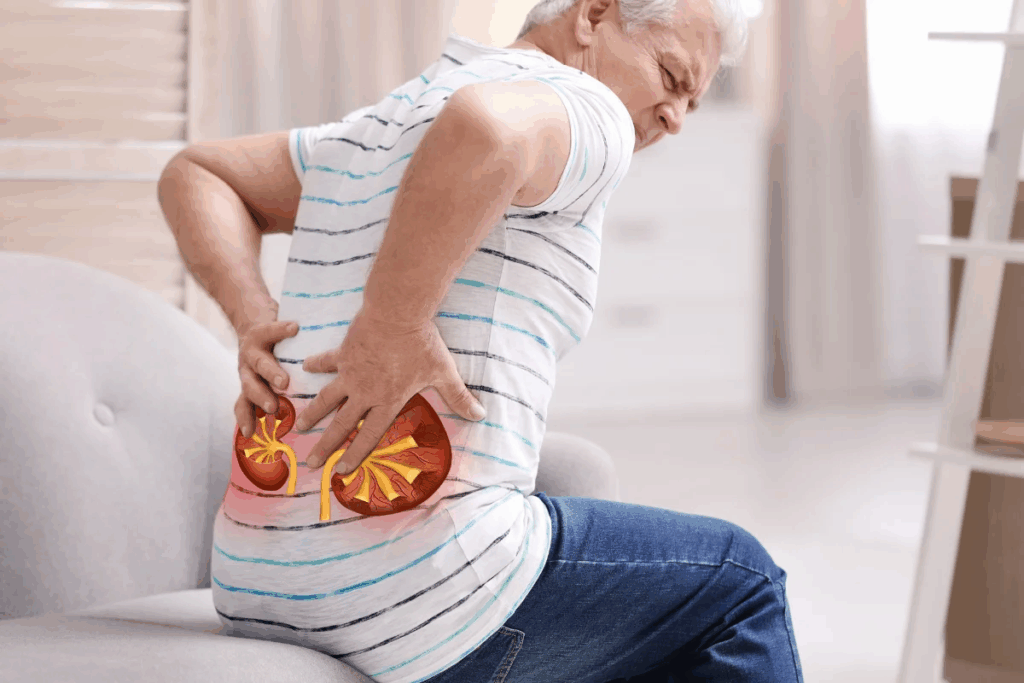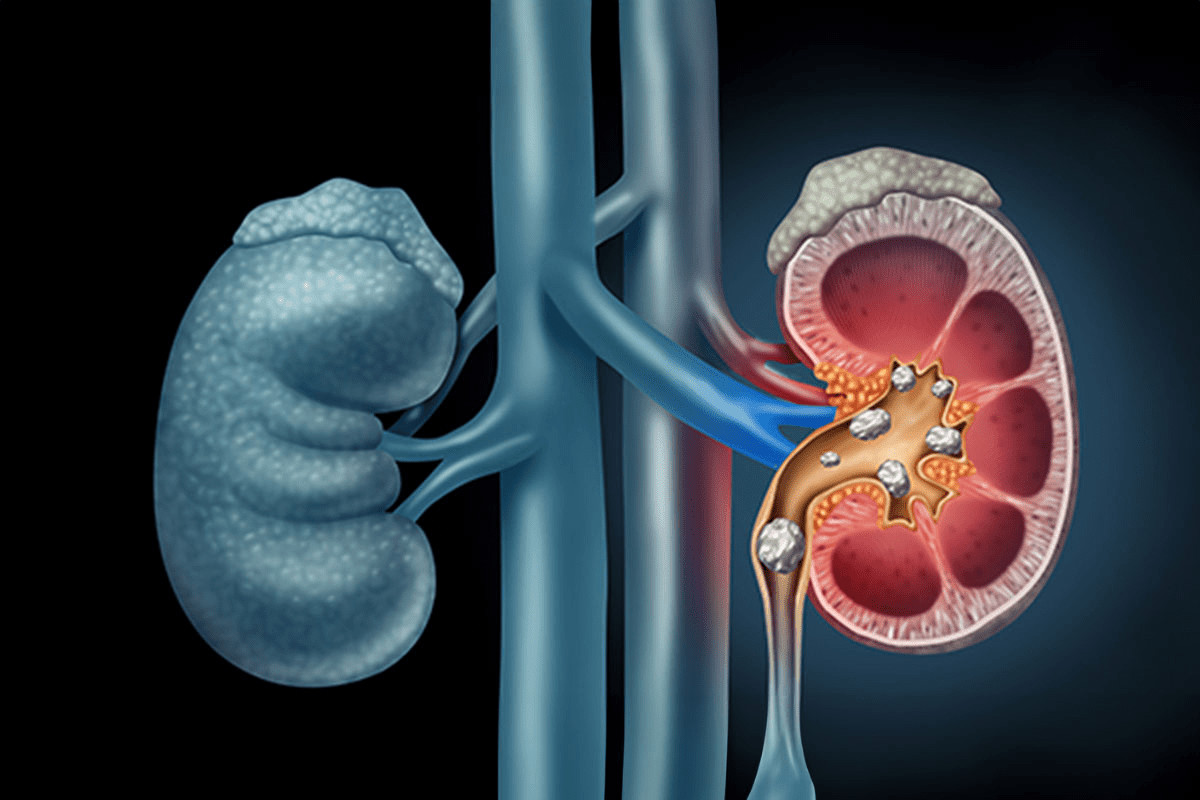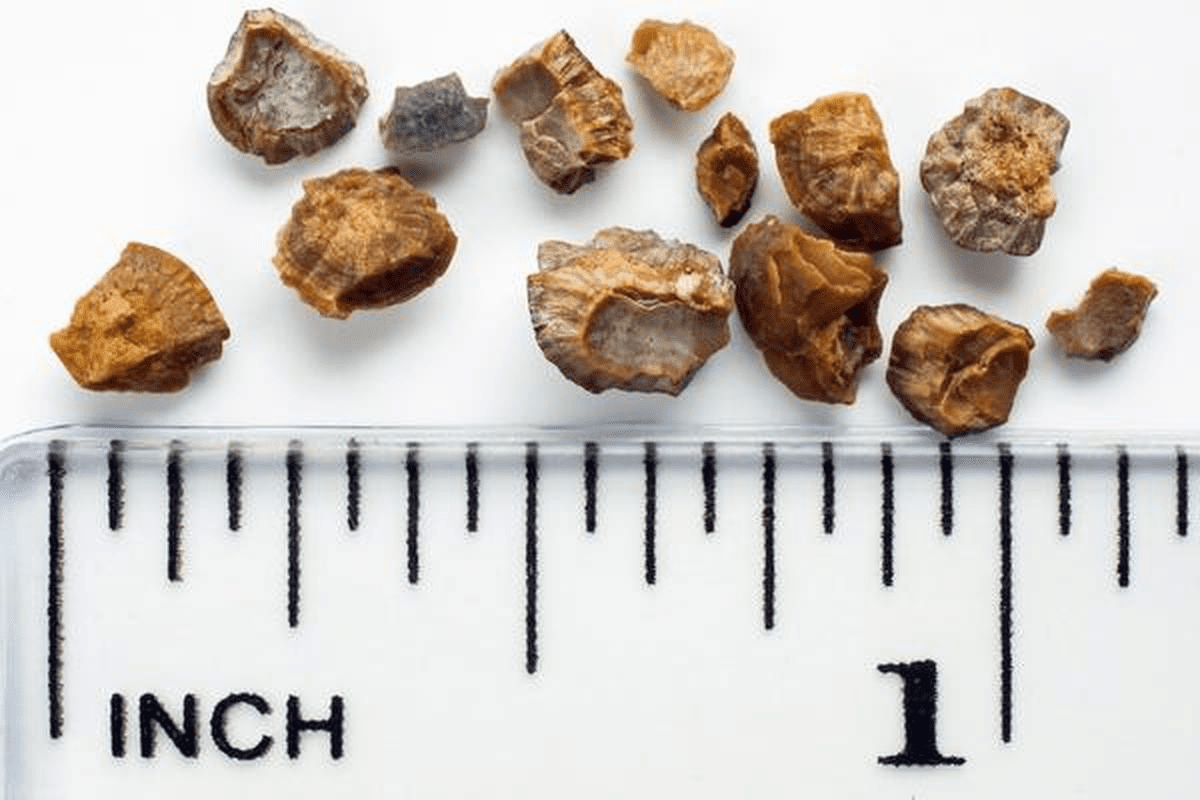
Calcium oxalate or black kidney stones are a big health problem, hitting millions globally. These hard objects, made of minerals and salts in urine, form inside the kidneys. Many people face these stones again and again, yet few use prevention strategies.
At Liv Hospital, we use advanced tests and tailor-made treatments to fight this issue. Our focus is on you, the patient, to offer full care for these painful stones. By knowing how to prevent and using proven diets and treatments, we can stop calcium oxalate kidney stones before they start.

It’s important to know about calcium oxalate kidney stones to prevent and treat them. These stones are a big health issue and are becoming more common worldwide.
Calcium oxalate stones are the most common type of kidney stone. They form when calcium and oxalate in urine combine. This mix can create small crystals that grow into stones. Factors like diet, how much you drink, and your genes can affect their formation.
Kidney stone disease, mainly calcium oxalate stones, is getting more common globally. Studies show that 30% to 50% of people with kidney stones will get them again. This high rate of recurrence highlights the need for good prevention methods.
Dealing with calcium oxalate (black kidney stones) is tough because they often come back. Research shows people who’ve had a stone are more likely to get another. Knowing what increases this risk is key to creating prevention plans for each person. By tackling these risk factors, we can lower the chance of stones coming back and help patients better.

To understand dark kidney stones, we need to look at how they form. Stones happen when urine has too much stuff that forms crystals. This is why calcium oxalate stones are so common.
The process starts when urine has too much of certain substances. This can be due to not drinking enough water, what we eat, or our genes. When there’s too much, crystals start to form.
Many things affect how crystals form, like the urine’s pH and other substances. Calcium oxalate monohydrate is a key type that shapes the stone’s makeup.
Calcium oxalate monohydrate is a big part of many stones. It forms when calcium and oxalate in urine mix right. This creates crystals that can grow into stones.
The presence of calcium oxalate monohydrate makes some stones harder to treat. This is because of their hardness and other traits.
Crystals start small and grow into stones over time. First, tiny crystals form in the urine. If they keep growing, they can block and cause pain.
Knowing how this happens helps us prevent stones. By stopping crystals from growing, we can lower our risk of getting dark kidney stones.
Knowing the risk factors for kidney stones is key to preventing them. We’ll look at the main factors that lead to calcium oxalate stones.
Genetics play a big role in kidney stones. If your family has a history of stones, you’re more likely to get them. Studies show that genetics can change how much stone-forming substances are in your urine. If you have a family history, it’s important to take steps to prevent stones.
Some medical conditions raise your risk of kidney stones. These include:
Managing these conditions can lower your risk of getting kidney stones.
Environmental and geographical factors also affect kidney stone risk. For example:
By knowing these risk factors, you can take steps to prevent kidney stones. This includes changing your diet, drinking more water, and managing health conditions.
Some diets, like those high in oxalate, protein, sodium, and sugar, may increase stone risk. Being aware of these can help prevent stones.
Spotting calcium oxalate stones early can greatly improve treatment results. We’ll look at the symptoms, from mild to severe. We’ll also talk about what to do if you notice them.
The first signs of calcium oxalate black kidney stones are often subtle but important. Look out for:
If you have any of these severe symptoms, get medical help right away:
At times, calcium oxalate stones may not show symptoms until they block the urinary tract. Regular check-ups and knowing your risk factors are key for early detection.
It’s important to know the symptoms of calcium oxalate stones for timely medical care. If you notice any symptoms, see a healthcare professional for the right evaluation and treatment.
Many think more calcium increases the risk of black kidney stones. But research shows the opposite is true. Adequate calcium intake can actually lower the risk of calcium oxalate black kidney stones.
Dietary calcium stops oxalate from being absorbed in the intestine. When you eat calcium with meals, it binds with oxalate. This forms calcium oxalate complexes that are then passed in the stool.
This reduces the oxalate absorbed into the bloodstream. Less oxalate means lower risk of kidney stones.
Key Point: Eating calcium-rich foods with meals can greatly lower kidney stone risk. It does this by reducing oxalate absorption.
Studies have looked at calcium’s role in preventing kidney stones. A key study in the New England Journal of Medicine found men with high calcium intake had lower stone risk. This compared to those with low intake.
Recent studies back this up. They show that calcium intake paradoxically lowers stone risk. This is by stopping oxalate absorption in the intestine. This highlights the need for enough calcium in your diet to prevent calcium oxalate stones.
The daily calcium need varies by age and sex. Adults usually need 1,000 to 1,200 mg per day. Good sources include dairy, leafy greens, and fortified foods.
It’s key to talk to a healthcare professional about your calcium needs. This is true, even more so if you’ve had kidney stones or other health issues.
Data shows that calcium from food doesn’t increase your risk of kidney stones. So, unless a doctor tells you to stop, keep eating calcium-rich foods as part of a balanced diet.
Managing oxalate intake is key to preventing calcium oxalate kidney stones. You don’t need to cut out oxalate completely. Just being aware of it can lower your risk of stones.
Instead of just cutting out high-oxalate foods, focus on getting enough calcium. Calcium stops oxalate from being absorbed in your gut. Knowing which foods are high in oxalate helps manage your intake.
Some foods are naturally high in oxalate and can increase your risk of stones. These include:
Food | Oxalate Content (mg per serving) |
Spinach (cooked) | 750-800 |
Rhubarb | 500-600 |
Beets | 400-500 |
Nuts (almonds, cashews) | 200-300 |
Chocolate | 100-200 |
For those at risk of oxalate stones, adding low-oxalate foods to your diet is helpful. Some good options are:
Certain cooking methods can lower the oxalate in high-oxalate foods. Boiling, for example, removes some oxalate into the water, which you throw away. This works well for veggies like spinach and beets.
By learning how to manage oxalate intake, you can lower your risk of calcium oxalate kidney stones. It’s about making smart food choices and using cooking methods that reduce oxalate.
Drinking enough water is key to lowering your risk of black kidney stones. It’s the most important change you can make. This is true, even if you’ve had kidney stones before.
To prevent kidney stones, knowing how much fluid you need is important. If you’ve had stones, your doctor might say to drink enough to make 2.1 quarts (2 liters) of urine a day. Drinking water and other fluids all day helps.
Checking your urine color is a good way to see if you’re drinking enough. Your urine should be pale yellow or clear. If it’s dark yellow or amber, you might need to drink more.
While water is the best, other drinks can also help. Here are some good ones:
Try to avoid drinks that might increase your stone risk. These include sugary, salty, or high-oxalate drinks.
Creating a hydration plan can help you stay on track. Here are some tips:
By following these tips, you can lower your risk of dark kidney stones. You’ll also keep your kidneys healthy.
Changing your diet can lower the chance of getting kidney stones. Some diets help by controlling oxalate, calcium, and urine health.
The DASH diet helps prevent kidney stones. It includes lots of fruits, veggies, whole grains, and lean proteins. It’s full of calcium, magnesium, and potassium, which stop stones.
Key parts of the DASH diet for stone prevention are:
The Mediterranean diet lowers kidney stone risk. It’s full of fruits, veggies, whole grains, and healthy fats. It’s also rich in antioxidants and has anti-inflammatory effects.
Key Mediterranean diet components for stone prevention are:
Less animal protein can stop kidney stones. Animal protein raises calcium, oxalate, and uric acid in urine, which are stone risks.
Studies show a low-animal protein diet:
By following these diets, you can lower your kidney stone risk and boost your health.
Lifestyle changes are key to managing and preventing kidney stones. By adding healthy habits to our daily lives, we can lower the risk of these painful stones.
Keeping a healthy weight is important to prevent kidney stones. Studies show that being overweight increases the risk. To manage weight well, we suggest:
These steps not only help prevent kidney stones but also boost our overall health.
Regular exercise is vital for a healthy lifestyle and can prevent kidney stones. But, it’s important to pick the right exercise and take care.
Exercise Type | Benefits | Precautions |
Aerobic Exercises (e.g., walking, cycling) | Improves heart health, helps with weight management | Avoid overdoing it, stay hydrated |
Strength Training | Builds muscle, boosts metabolism | Start with light weights, then increase |
Yoga and Stretching | Increases flexibility, reduces stress | Avoid deep twists that may harm the kidneys |
It’s wise to talk to a doctor before starting any new exercise, even more so if you have health issues.
Stress can lead to health problems, including kidney stones. Good ways to reduce stress include:
By using these methods daily, we can lessen stress’s negative effects on our health.
In summary, making lifestyle changes is essential for long-term kidney stone prevention. Focusing on weight management, regular exercise, and stress reduction can greatly lower the risk of stones and improve our health.
For those who often get kidney stones, supplements and medicines can help a lot. Some drugs can lower the amount of minerals and salts in urine. This makes it less likely for stones to form.
Citrate supplements are good for people with calcium oxalate stones. They bind to calcium in urine, reducing the chance of stone formation. Citrate also makes urine less acidic, which helps prevent stones.
Studies show citrate supplements can cut down on kidney stone returns. Potassium citrate is a top choice because it’s safe and works well.
High-risk patients have many prescription options. Thiazide diuretics, for example, lower urine calcium levels. Allopurinol is used for those with high uric acid levels, which can cause stones.
It’s key for high-risk patients to talk to their doctor about the right medicine and dose. Regular check-ups are needed to see if the treatment is working and to make changes if needed.
Some medicines can raise the risk of kidney stones. Antibiotics and HIV treatments are examples. It’s important to tell your doctor about all your medicines to avoid risks.
Also, some over-the-counter vitamins and minerals can increase stone risk if taken too much. Always check with your doctor before starting any new supplements.
Medication/Supplement | Effect on Kidney Stone Risk | Precautions |
Citrate Supplements | Reduces risk | Consult a healthcare provider for appropriate dosage |
Thiazide Diuretics | Reduces risk | Monitor for side effects such as low blood pressure |
Allopurinol | Reduces risk for uric acid stones | Monitor liver function and blood counts |
High-dose Vitamin C | Increases risk | Avoid high doses unless medically necessary |
Monitoring and testing are key in managing kidney stone risk. For those who have had stones, regular check-ups are vital. They help prevent more stones and manage any complications.
There are important lab tests for those who have had kidney stones. These include:
These tests help doctors understand why stones form. They then create a plan to prevent more stones.
A 24-hour urine test gives important info on stone formation. It measures:
Knowing these results is key to managing stone risk. For example, if oxalate levels are high, changing your diet may be needed.
As one study showed, “The 24-hour urine test is a critical tool in assessing the risk of kidney stone recurrence and guiding preventive measures” (
This test is essential for understanding the underlying causes of stone formation and developing a targeted prevention strategy.
Working with healthcare specialists is vital for the best care. Specialists like nephrologists or urologists can:
By teaming up with specialists, you can lower your risk of getting more stones. You can also manage your condition well.
Creating a plan to prevent calcium oxalate kidney stones is key. Knowing what causes stones helps us find ways to stop them. This way, we can lower our risk.
A good plan might include lifestyle changes and special medicines. These can help manage stones and prevent them from coming back.
To make a plan work, it’s important to work with doctors. They can help find the best strategies for you. By making diet changes, drinking enough water, and using other prevention methods, we can lower our risk of stones.
Being proactive about preventing kidney stones is empowering. It helps us take care of our health and avoid the pain of stones.
Calcium oxalate kidney stones form when calcium and oxalate mix in urine. They are the most common type. They can be painful if they block the urinary tract.
To prevent these stones, make dietary changes and stay hydrated. Follow a balanced diet and work with your doctor. This helps manage your risk.
Dietary calcium is key in preventing stones. It binds to oxalate in the gut, reducing its absorption. This helps prevent calcium oxalate stones.
Hydration helps by diluting urine. This reduces mineral concentration that can form stones. Drinking plenty of water is essential.
Limit foods high in oxalate like spinach, beets, and chocolate. Nuts and certain teas also have high oxalate levels. Reducing these foods can lower your risk.
Yes, conditions like hyperparathyroidism and inflammatory bowel disease can raise your risk. Managing these conditions is important.
The DASH diet focuses on whole grains, fruits, and vegetables. It also includes lean protein and low-fat dairy. It helps prevent stones by promoting a balanced diet.
Citrate supplements, like potassium citrate, can help by increasing urine citrate levels. But always talk to your doctor before starting any supplements.
Urine testing frequency depends on your risk factors and medical history. A 24-hour urine test is often recommended to assess your risk.
Yes, regular exercise and stress reduction can help. They promote overall health and reduce stone formation risk.
Specialists like urologists offer personalized care for stone prevention. They help create a prevention plan tailored to you.
Identify high-oxalate foods and find alternatives. Use cooking methods that reduce oxalate content. This helps manage your risk.
The Mediterranean diet promotes health by focusing on whole grains and healthy fats. It helps prevent stones by providing essential nutrients.
Yes, reducing animal protein can help. It lowers uric acid levels, which can contribute to stone formation.
Social Determinants of Kidney Stone Disease – https://pmc.ncbi.nlm.nih.gov/articles/PMC9817034/
Subscribe to our e-newsletter to stay informed about the latest innovations in the world of health and exclusive offers!
WhatsApp us